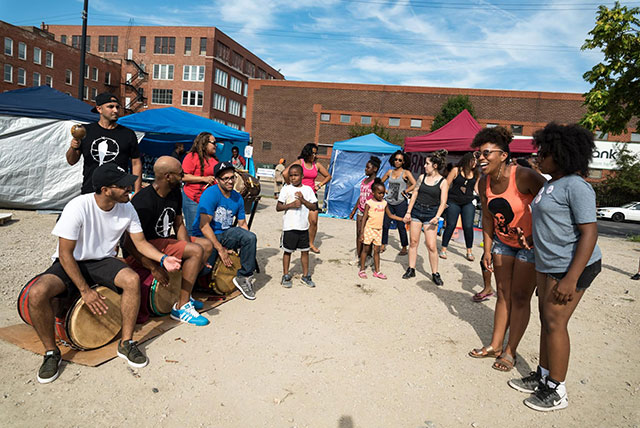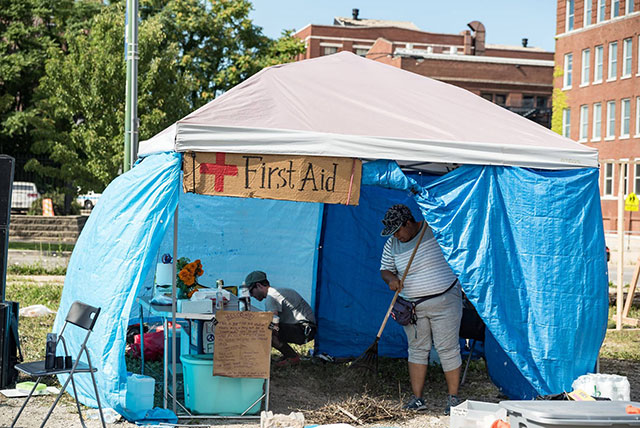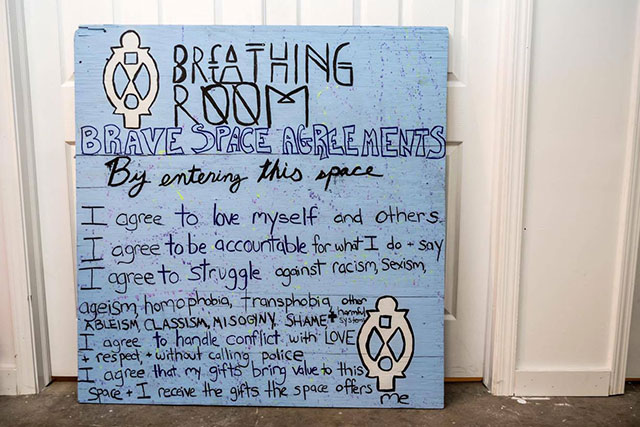
Did you know that Truthout is a nonprofit and independently funded by readers like you? If you value what we do, please support our work with a donation.
Chicago — Today is Day 17 of occupying Freedom Square, a block party protest in opposition to Homan Square, the Chicago Police Department (CPD) “black site” that is internationally infamous for illegal detention and torture. Set up in a lot adjacent to the Homan Square facility in the North Lawndale neighborhood on Chicago’s West Side, the encampment includes an outdoor kitchen, tents to sleep in, a library, play areas, political education and organizing spaces and more.
On Day 9 of the occupation, the campsite — supplied and staffed entirely by donations and volunteers — experienced its first violent conflict. After a beautiful day including free bike repair workshops and craft projects, free food for the community, and ongoing political engagement, the occupation site devolved into chaos when adults intervened in a disagreement between kids about sharing bikes. Folks felt disrespected, and misunderstandings and continued transgressions raised tensions, even as Freedom Square organizers made their best efforts to de-escalate the situation. One woman emerged from the fight with a black eye, and several others nursed scrapes and bruises once the scuffle was finally calmed. Freedom Square’s medic bandaged folks up in the First Aid tent as I began to gather the 30 or so people at the camp into a circle to debrief about the conflict. We shared collective space with each other, discussing the harms that had occurred within our community. We talked through accountability steps (steps that could be taken to address those harms). Nobody called the police.
 A first-aid tent in Freedom Square. (Photo: Sarah-Ji Rhee, Love & Struggle Photography)
A first-aid tent in Freedom Square. (Photo: Sarah-Ji Rhee, Love & Struggle Photography)
Freedom Square first emerged on Wednesday, July 20, in collaboration with the Black Youth Project 100’s civil disobedience blockade of Homan Square. The action was organized in conjunction with the July 21 #FreedomNow National Day of Action — a day of collective actions for justice simultaneously held across the US in response to a national call put out by the Movement for Black Lives. While activists chained themselves together across the entrance to the facility, shutting down police traffic for the day, the #LetUsBreathe Collective — a Chicago-based alliance that “aims to harness creative capital and cultural production to deconstruct systemic injustice” — led a march from 15th and Albany, the site where CPD Officer Dante Servin murdered unarmed 22-year-old Rekia Boyd, to Homan Square, to meet and celebrate the blockade. The vacant lot across the street was taken over and transformed into “Freedom Square” — combining elements of the Collective’s Breathing Room event series (a multidisciplinary space connecting those most affected by mass incarceration to the organizing community of Chicago) with an outdoor block party so that protesters would have a safe, joyful place to gather once police gave an order to disperse.
Freedom Square includes a free store — where residents can pick up free items, such as books, clothing and toiletries — and a community canvas for collective art-making. The space includes seven tents, to symbolize the seven resource areas organizers believe Chicago should invest in instead of police: restorative justice, education, mental health, employment, fair housing, arts, and nutrition. At the end of the night, the North Lawndale youth who had come out to enjoy the event hoped the tents meant we were staying overnight and excitedly asked if they could camp with us. We weren’t prepared to stay that night, but felt deeply compelled by the longing for continued engagement. The move to relaunch Freedom Square as an occupation that Friday was a spontaneous decision to deploy an extreme political tactic, largely informed by the positive feedback from the North Lawndale community, especially the children.
At least once a day, an organizer with #LetUsBreathe calls the camp to a circle to review the Brave Space Agreements, the code of conduct originally crafted for Breathing Room, which now governs Freedom Square. We talk through a range of common conflicts through the Agreements — from bullying to stealing to consent.
 (Photo: Kristiana Rae Colón)
(Photo: Kristiana Rae Colón)
The Brave Space Agreements read:
By entering this space
I agree to love myself and others.
I agree to be accountable for what I do and say.
I agree to struggle against racism, sexism, ageism, homophobia, transphobia, ableism, classism, misogyny, shame, and other harmful systems.
I agree to handle conflict with love and respect, and without calling police.
I agree that my gifts bring value to this space and I receive the gifts the space offers me.
#LetUsBreathe moves beyond the common activist jargon of “safe space” and instead seeks to achieve brave space, because we believe that the notion of total safety in any space is harmful and illusory. There is no space in the real world where harm can be prevented 100 percent of the time, and while we can collectively struggle for physical and emotional safety, the revolution lives in handling conflicts, even and perhaps especially violent conflicts, lovingly and bravely.
After the conflict of Day 9, the circle chanted through the Brave Space Agreements once more, then we pulled out a whiteboard and brainstormed a set of de-escalation tactics to employ the next time a fight seems imminent. We crafted a new chant specifically aimed at calming interpersonal conflict and assigned three tiers of active roles for intercessors (people within the community who step in when conflicts occur). And though we still haven’t succeeded in bringing all of the parties involved in the fight into a restorative justice circle (a gathering in which those involved in a conflict come together with others in the community to discuss the harms that have occurred and collectively develop a plan to facilitate healing and move forward), on Day 14, the children involved are playing together again on the lot.
 (Photo: Kristiana Rae Colón)
(Photo: Kristiana Rae Colón)
Freedom Square is overwhelmingly beautiful in its aspirational politics, but it is not perfect. It’s messy, it’s tiring, and in waves of oppressive heat, it takes a lot of self-awareness and patience to keep moment-to-moment frustrations in check. The ideology of imagining a world without police powerfully resounds in media clips, on protest signs, and in the air-conditioned comfort of organizing meetings; but at Freedom Square, activists and North Lawndale neighbors live, sleep, and labor side by side in 24-hour service to a community healing from decades of generational trauma, social divestment, and internalized violence. We don’t have it all figured out, but with each passing day of the occupation, our hearts evolve as dramatically as our infrastructure. We come to the work with a deep will to be personally transformed and the courage to face down whatever violence, danger, or harm we encounter or create along the way.
Liberation is not some distant utopian goalpost where a journey of political struggle concludes. Liberation is the constant healing from and evolution past harmful systems, and more urgently, the daily injuries we inflict on each other. Organizing meetings, petitions, campaigns and spectacles of civil disobedience all have their place in the struggle to defeat oppressive systems, but the true work of movement-building happens on the block, where the young Black men and women who are constantly abstracted into hashtags are alive, beautiful and full of contradiction. Freedom Square is not only a protest occupation, a pop-up neighborhood engagement center and a laboratory for nation-building; it’s where abolitionist politics are tested and applied every moment of every day. We stumble and sometimes hurt each other on our journey toward braver relationships and visions of liberation. We stay committed to healing together. We don’t call the police.
 (Photo: Kristiana Rae Colón)
(Photo: Kristiana Rae Colón)
Speaking against the authoritarian crackdown
In the midst of a nationwide attack on civil liberties, Truthout urgently needs your help.
Journalism is a critical tool in the fight against Trump and his extremist agenda. The right wing knows this — that’s why they’ve taken over many legacy media publications.
But we won’t let truth be replaced by propaganda. As the Trump administration works to silence dissent, please support nonprofit independent journalism. Truthout is almost entirely funded by individual giving, so a one-time or monthly donation goes a long way. Click below to sustain our work.